Introduction
In global tourism and hospitality, it is necessary to maintain the smartness and innovations that may help in empowering the organisational recovery that leads towards betterment. In this report, the selection has been done on accommodation in the hospitality industry after Covid-19 which will take it to grow in the future. The company that has been selected is Hyatt where the discussion on future awareness will be taken as per the development of the organisation. The analysis of the market has been taken for discussion with the key competitors that influence the organisation based on the external environment.
Company background
The company, Hyatt, which configures global hospitality with care, is located in the United States and globally puts its significance by embracing the guests with the optimum warmth of care and support. The Hyatt has been seen to record $3.0 million in the year 2021 which has strengthened its revenue through its excellent management and coordination with its employees (Hyatt Hotels Corporation. 2022). It has 1,64,000 approximately trusted and loyal employees who deal with customers from any part of the world with the capability and good management. The care for the community, guests, employees, and owners of the company has been committed to the company’s care impact which has been successfully advancing the culture.
Technology and smartness brought in by innovation to accommodation in the tourism and hospitality industry
Smart energy management
Smart sensors and thermostats respond in the occupancy which manages the energy management system and uses sophisticated learning of the machines that determine the weather pattern that gives the opportunity. The management of smart energy saves the hotel budget and cost by over 20 per cent by generating the fastest feedback with a significant increase in the value of tourism in the accommodation and hospitality industry. This technology deals with heating and cooling in the hospitality industry which gives visitors a touch of relaxation. The technology in the lightning enables the hospitality industry to an accommodation with the help of the understanding of the energy that has been used and needed which will occupy the time change in the reality that gives the opportunity (Tomczyk et al. 2022).
Predictive maintenance
In recent times it has been seen that the smart technology bring on in the accommodation in tourism and hospitality industry has been settled down with the Internet of Things (IoT) that make the system enable the foreseeing of the maintenance of the staff by the usage of the system along with the enabling of the engineers that hold on the system and reduces the cost in the faulty system. Recent times evidencing the management of the growth in the social media platform along with search engine optimization has brought the change in the experience of the distribution in the channels that gives the opportunity (Xiang et al. 2015).
Smart guest experiences
The big hospitality and tourism business is based on the accommodation with the guests that will be dealt with by the smart reference of the technology that will bring the changes in terms of growth and making a profit that gives the opportunity. The need to maintain the data of the guest is crucial in the stage by reducing the issues and fictional points with the smartest technology which will be placed by the occupancy sensors. In this manner, the track of the guests will be kept and the interaction will be made in the smartest way that will reduce the mess caused by the hotels (Stylos et al. 2021).
Remote check-in and check-out
The use of remote check-ins controls the management of the services and the cost which helps in the reduction of the problems caused by the hospitality industry and helps in the self-using options that deal with the magic of development in the accommodation in tourism. This also helps in alerting the staff when the arrival of the guests happens which helps in the prompt action by the staff’s help in the experienced in a good manner. The smart technology that deals with the check-outs help in the self-operation help in the seamless journey in the hotel which makes them travels to their respective destination.
The rationale for this report with the help of a conceptual framework
Through Leiper’s three elements such as the Human element, the industrial element and the geographical element, this research has been conducted to elevate the effectiveness of innovation and technological implementation after the Covid-19 outbreak. The research has helped in getting an overview of the independent variables external environment analysis (Porter’s 5 Forces), Crisis Management, Competitor Analysis, New realities in the global market, Impact of Covid-19 in the tourism and hospitality industry where the dependent variable has been concluded technology and smartness in innovation to empower the organisational recovery within 2030.
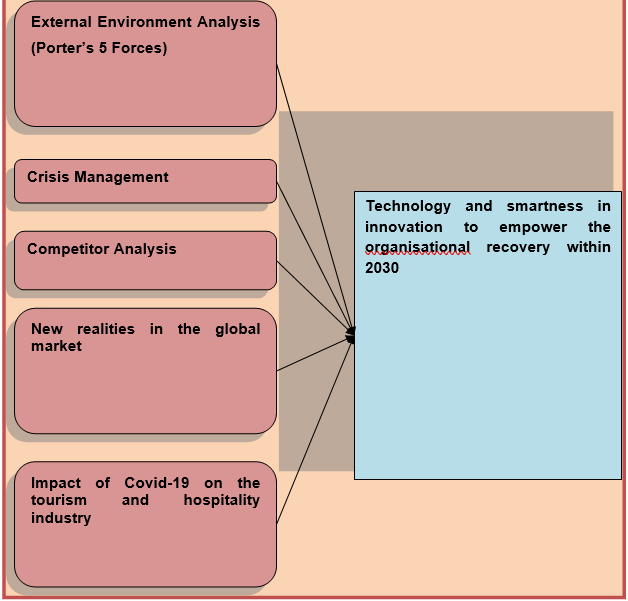
Figure 1: Conceptual framework
(Source: self-created)
Market analysis that Hyatt attracts
The company has the purpose and vision of serving the people with care and understanding of the world and the preference of the customers with integrity, empathy, creativity, and respect with advancement. It has the targeted customers of businessmen, affluent travelers, potential customers, corporate houses and celebrities as the human element of Leiper’s model that attracts visitors to stop in the hotel. The age group Hyatt has targeted is diversified and includes teenagers to the age who allow themselves the spending vacations. The Business is the travelling conceptualises in the exotic which helps in the attraction of customers with the best technology that is delivered by the strategies (Willis et al. 2017).
Key players in the market (competitors)
The key players of Hyatt in the United States are Marriott International, Wyndham Destinations, and many more which are offering similar facilities to their customers hence is a threat to the company. Taj hotels, Starwood hotels and resorts, Hilton hotels, Shangri-La Asia, Accor and Four Seasons Hotels and Resorts and many more are the key players in the global platform that deals with the same issue which is faced by Hyatt. The heritage industry seeks the attention of the visitors with its maximised cultural growth and technological advancement that helps in guiding the visitors properly ensures the values of the customers in all sorts of ways (Tscheu and Buhalis 2016).
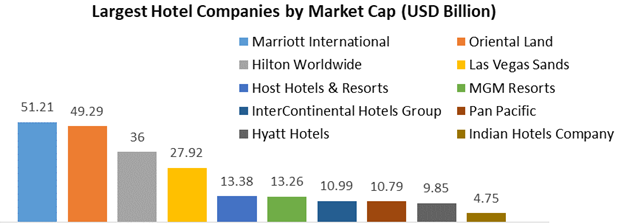
Figure 2: Key players in the market
(Source: Tscheu and Buhalis 2016)
External environment analysis and crisis management with resilience management
PESTLE Analysis as an industrial element of Leiper’s model
Political: Before a PESTLE analysis is done, the structure of the political conditions needs to be studied in the USA, where the national parliamentary structure is consolidated by the Congress of the nation, with the President as the presiding authority. By Khodadadi (2018), as long as the reign of the former president of the USA, Donald Trump had been reigning within the constituency, there had been profit to the tourism and hospitality industry of the USA. However, the Congress power in the USA may be redesigned or modified by the power of the Parliament of the nation, as the political system is more of a Republican system of power (Usembassy.gov 2022).
Economical
The tourism and hospitality industry in the nation of the USA had been down since the attack of Covid-19, whereas now it had improved and quite gained momentum given the industry-wide Gross Domestic Product increment. As per the reports of government officials, the GDP rate of growth had been almost 1.5% in the year 2020 and later the decrement is around 3.4% in the year 2020 as to the U.S. Bureau of Economic Analysis (BEA) (2022).
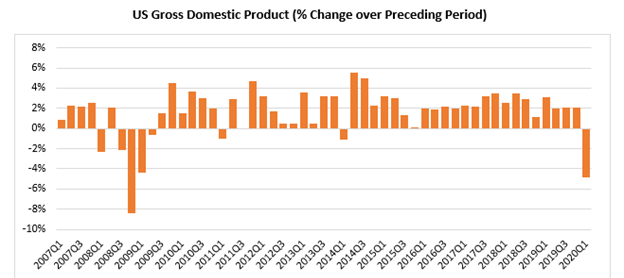
Figure 3: USA GDP decrease in 2020
(Source: U.S. Bureau of Economic Analysis (BEA) 2022)
The economy of the USA has increased to a greater nation after brand promotion had increased to a great degree, and hence, the economy rapidly intensified after Covid-19 (Can et al. 2020).
Social
There is a differentiated social impact on the tourism and the hospitality industry of the USA after the direct onset of Covid-19, and recent studies have found that Hyatt suffered a loss due to the social issues manifesting as psychological issues in the patients. Mostly, due to the year 2020 being tough on the economic impacts, the psychological barriers created by the social dissociation are affirmative to be stated (U.S. National Library of Medicine 2022).
Technological
There is a range of technological advantages that the USA tourism and hospitality had been witnessing since the year 2020, such as excessive voice control for map navigation, without contact payment and the use of chatbots for instant assistance. It has been seen that recent times are evidencing the rise in modern technology, such as the tourists as the “Digital Detox Traveller” or the “Dual Zone” and few others that are finding quite much use. It needs to be informed that the technology of innovation has been brought in by Hyatt such as the Virtual Reality (VR) technological system, or the use of the dedicated built version of the Hyatt application (Hyatt Hotels Corporation 2022).
Legal
The torsion and the hospitality industry in the USA had been quite changed after Covid-19 as new rules and amendments regarding industry-wide moderation have been carried on. After the pandemic, the emerging rules for immigrants and outside travellers sanctioned by the Government of the USA have been in effect, where the Visitor Visa B-2 had been made to be in effect after the Visa Waiver Program Legislation (Travel.state.gov. 2022). It has been quite much compulsory that the Visitor Visa program has not been in effect due to the Immigration and Nationality Act where immigrants from Taiwan and China have been considered to be effective (Travel.state.gov. 2022).
Environmental
Recently, there had been ecotourism in the USA after a long decade, and the places such as Madagascar, or Costa Rica had been considered in this aspect to be quite great for such tourism and hospitality facilities. There are a few of the benefits that ecotourism accrues to the nation, and there is a strong difference between ecotourism and any kind of entertainment activities (Stronza et al. 2019).
Crisis management and management of resilience
Management of the crisis from the perspective of the world has been recorded and found to be true for better results if the tourism and hospitality industry wishes to survive in the long run. Hyatt makes this crisis management and the management of the resilience quite well to channelise the overall system of reliance on the workers by the process of training (Hyatt Hotels Corporation 2022). This requires the talent management of the hotels to be true and requires the different hotels to train the workers better for creating a better talent scope (Kichuk et al. 2019). In the USA, the policy of government had changed quite much and a clear system of managing the overall crisis period had been noticed, to manage the loss of 80% and reduce all the limitations of tourism and hence relaxing norms (OECD. 2022). Thus, Hyatt had immensely benefited after all the travel restrictions had been resolved and the required change had been made in the tourism department of the USA, such as creating airport checking protocols.
Crisis management in the tourism industry thus had been taken to chief consideration for better resource management and to get the 60% recovery in the national income of the USA. The recruitment method has been made different and fair for the employees in the entire process of crisis management, where the online candidate profile has been targeted for potential candidate recruitment as said by Ladkin and Buhalis (2016). This crisis has been globally spread, and not limited to one portion of the nation, because of the Covid-19 pandemic making the crisis of employee immigration severe. Many of the OECD nations had been widely affected due to this pandemic talking about the tourism and hospitality industry, as around 52% of the national income had been due to tourism in Spain (OECD. 2022).
Health, economic, socio-cultural and the different environmental impact of the Covid-19 for tourism and hospitality industry
Health impact
There had been a wide range of health impacts on the different tourists due to Covid-19 as may be counted, reading the diseases and psychological exhaustion. A range of articles on the same topic had been regarded as useful and had been cited here, to show how the health of the tourist deteriorated with the onset of Covid-19. As the year 2022 approached, almost a count of 57% of tourists stopped to enter or migrate, which duly affected the tourism industry. On the same note, the flight system had been disrupted in the Covid-19 situation and 207 million airline services had faced the issue, which had lower due to 44% (UNWTO 2022).
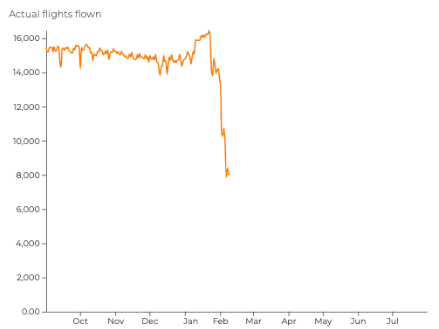
Figure 4: Flight disruption due to Covid-19
(Source: UNWTO 2022)
Especially in the USA, the health impact of this boarding tourism had been so severe that national surveillance had been set up where the former President, Donald Trump had taken to find the source of the contamination. The health condition of international tourists in the nation has been endangered and research study has been made to understand the exact form of the outbreak, and to study how the health infections cause lower bookings of tickets (Li et al. 2022).
Economic impact
The American way of living had been devastated by the number of people falling prey to the disease and globally almost 31.6 million had been the target of Covid-19, of which America has a larger share (Refer to Appendix 1). In the tourism industry of the USA, the owners as stakeholders particularly had suffered the pandemic situation a heavy blow, as there had been too little financial support for these women working in the tourism industry. Many of the USA citizens think that the support of the state was needed after the crisis, and there had been a count crossing almost 60% of the US population earning lower than $25,000 (Refer to Appendix 1). The median income range in the USA had been deeply disturbed after Covid-19 had crept up, and there was a wealth bias where the black community of the USA had suffered much in the dark situation (McClure et al. 2020).
Socio-cultural impact
Covid-19 had created a cultural shock all over the world, and the socio-cultural aspect if examined may be estimated that a large number of people suffer the cultural shock. The reason that there had been a socio-cultural shock existing within the nation of USA after Covid-19 is because the employing organisations usually do not understand the specific demands of the internal stakeholders similar to employees working in remote culture (Ladkin et al. 2016
Environmental impact
The environmental impact during the first months of the lockdown had been serious, and there had been constant enhancements in the situations after the lockdown had been announced, such as better quality of water or less pollution in the air. Research journals had been in appreciation of the occurrence of the pandemic for the improvement in the overall quality of the air quality, and this may be appropriately discussed where the USA scored better ranking, sustaining the Covid-19 effects as stated by the U.S. National Library of Medicine (2022).
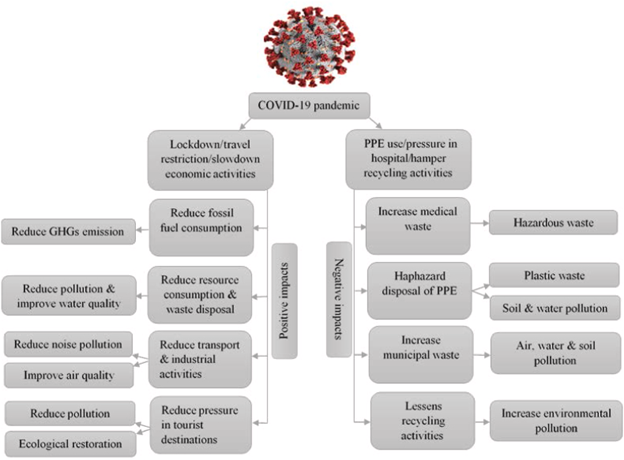
Figure 5: Impact of Covid-19 on better climate change
(Source: U.S. National Library of Medicine 2022)
Critical analysis to find out the direct ways by which technological innovation and smartness may support the resilience and recovery of Hyatt by bringing in opportunities
Hyatt has been using different technological forms of innovation to create a sense of better accommodation for migratory tourists to stay and enjoy comfort, for which on-demand television and guest facilities had been made available. Moreover, the hospitality and tourism provider of the USA may create a more sustainable system of direct guest experience by including a Virtual Reality simulated atmosphere in the hotel rooms and thus make a better performing property management. There has been a dedicated study developed on the same argument of tourism flourishing and the exposure to the modern technologies being used by the business units such as Hyatt (Page et al. 2017). Modern technologies such as the assistance of tourists suffering from any kind of disabilities have been applied and in the new age, these technological innovations have been moderating the tourism experience (Rubio et al. 2021). Hyatt may introduce such a system of technological innovation to assist disabled people and make a better performance-oriented mechanism to customise the accommodation experiences (Rubio et al. 2021).
Future awareness of Hyatt in the different new realities and the emerging global marketplace
There are certain areas on which Hyatt needs to focus better and increase the efficiency within the hotel operations, which are the critical areas of future awareness. The future awareness of the company may be increased if sufficient steps may be adopted and all these steps are maintained within the company’s portfolio. Future understanding in terms of business refers to the model by which the employees or the management as internal and external stakeholders of the company may accept the challenging aspects of the future and have a better resilient outlook, which is quite much true. The overall customer system in the current discussion needs to be measured by metrics as far as the company of Hyatt goes on, the personalisation of the price steward is the metric by which a company may function and operate, as far as the tourism and hospitality industry is concerned (Tomczyk et al. 2022).
Conclusion
Thus, from the above analysis, it has been concluded that the case of Hyatt has faced different challenges and all of these challenges have been recorded to be greater, more serious and quite much disruptive. Technological innovation and the use of modern technology to combat these changes, those after Covid-19 had been proposed and analysed, where a specific portion of the discussion had been dedicated to the analysis.
References
Can, A.S., Ekinci, Y., Viglia, G. and Buhalis, D., 2020. Stronger together? Tourists’ behavioural responses to joint brand advertising. Journal of Advertising, 49(5), pp.525-539.
Hyatt Hotels Corporation. 2022. – D18rn0p25nwr6d.cloudfront.net (no date). Available at: https://d18rn0p25nwr6d.cloudfront.net/CIK-0001468174/ec2f121c-9941-4dd9-b50a-0aff00d26816.pdf (Accessed: October 31, 2022).
Khodadadi, M., 2018. Donald Trump, US foreign policy and potential impacts on Iran’s tourism industry: Post-nuclear deal. Tourism Management Perspectives, 26, pp.28-30.
Kichuk, A., Brown, L, and Ladkin, A. (2019). Talent pool exclusion: the hotel employee perspective. International Journal of Contemporary Hospitality Management, 31(10): 3970-3991. https://doi.org/10.1108/IJCHM-10-2018-0814
Ladkin, A. and Buhalis, D., 2016. Online and social media recruitment: Hospitality employer and prospective employee considerations. International journal of contemporary hospitality management.
Ladkin, A., Willis, C., Jain, J., Clayton, W. and Marouda, M., 2016. Business travellers’ connections to home: ICT s supporting work‐life balance. New Technology, Work and Employment, 31(3), pp.255-270.
Li, Z., Wang, D., Abbas, J., Hassan, S. and Mubeen, R., 2022. Tourists’ health risk threats amid COVID-19 era: role of technology innovation, Transformation, and recovery implications for sustainable tourism. Frontiers in Psychology, 12, p.769175.
McClure, E.S., Vasudevan, P., Bailey, Z., Patel, S. and Robinson, W.R., 2020. Racial capitalism within public health—how occupational settings drive COVID-19 disparities. American journal of epidemiology, 189(11), pp.1244-1253.
OECD. 2022. Tourism policy responses to the coronavirus (COVID-19). . Retrieved October 31, 2022, from https://www.oecd.org/coronavirus/policy-responses/tourism-policy-responses-to-the-coronavirus-covid-19-6466aa20/
Page, S.J., Hartwell, H., Johns, N., Fyall, A., Ladkin, A. and Hemingway, A., 2017. Case study: Wellness, tourism and small business development in a UK coastal resort: Public engagement in practice. Tourism Management, 60, pp.466-477.
Rubio-Escuderos, L., García-Andreu, H., Michopoulou, E. and Buhalis, D., 2021. Perspectives on experiences of tourists with disabilities: implications for their daily lives and the tourist industry. Tourism Recreation Research, pp.1-15.
Stronza, A.L., Hunt, C.A. and Fitzgerald, L.A., 2019. Ecotourism for conservation?. Annual Review of Environment and Resources, 44, pp.229-253.
Stylos, N., Zwiegelaar, J. and Buhalis, D., 2021. Big data empowered agility for dynamic, volatile, and time-sensitive service industries: the case of the tourism sector. International Journal of Contemporary Hospitality Management.
Tomczyk, A.T., Buhalis, D., Fan, D.X. and Williams, N.L., 2022. Price-personalization: Customer typology based on hospitality business. Journal of Business Research, 147, pp.462-476.
Tomczyk, A.T., Buhalis, D., Fan, D.X. and Williams, N.L., 2022. Price-personalization: Customer typology based on hospitality business. Journal of Business Research, 147, pp.462-476.
Travel.state.gov. 2022. U.S. Department of State. Retrieved October 31, 2022, from https://travel.state.gov/content/travel.html
Tscheu, F. and Buhalis, D., 2016. Augmented reality at cultural heritage sites. In Information and communication technologies in tourism 2016 (pp. 607-619). Springer, Cham.
U.S. Bureau of Economic Analysis (BEA). 2022. Travel and tourism. Travel and Tourism | U.S. Bureau of Economic Analysis (BEA). (n.d.). Retrieved October 31, 2022, from https://www.bea.gov/data/special-topics/travel-and-tourism
U.S. National Library of Medicine. 2022. Home – PMC – NCBI. National Center for Biotechnology Information. Retrieved October 31, 2022, from https://www.ncbi.nlm.nih.gov/pmc/
UNWTO. 2022. World Tourism Organization. Retrieved October 31, 2022, from https://www.unwto.org/impact-assessment-of-the-covid-19-outbreak-on-international-tourism
Usembassy.gov. 2022. The political system in the U.S. – structure. USA I Skolen. (n.d.). Retrieved October 31, 2022, from https://dk.usembassy.gov/da/youth-education-da/the-american-political-system/the-political-system-in-the-u-s-structure/#:~:text=In%20the%20United%20States%2C%20the,function%20as%20the%20judicial%20branch.
Willis, C., Ladkin, A., Jain, J., Clayton, W. (2017). Present while absent: Home and the business tourist gaze. Annals of Tourism Research, 63: 48-59.
Xiang, Z., Tussyadiah, I. and Buhalis, D., 2015. Smart destinations: Foundations, analytics, and applications. Journal of Destination Marketing and Management, 4(3), pp.143-144.
Appendices
Appendix 1
https://www.brookings.edu/blog/how-we-rise/2022/03/30/covid-19-takes-its-toll-on-american-life/
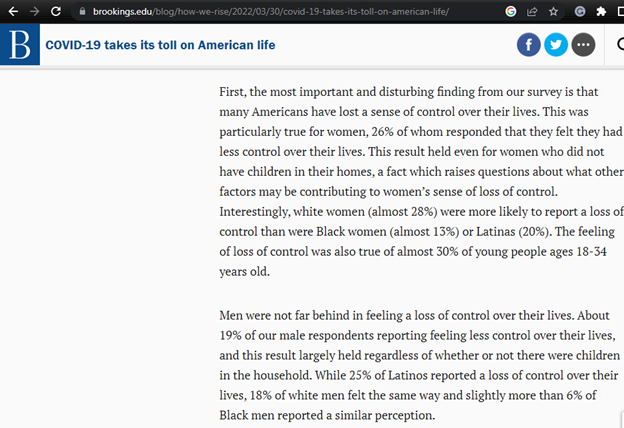
Know more about UniqueSubmission’s other writing services:

